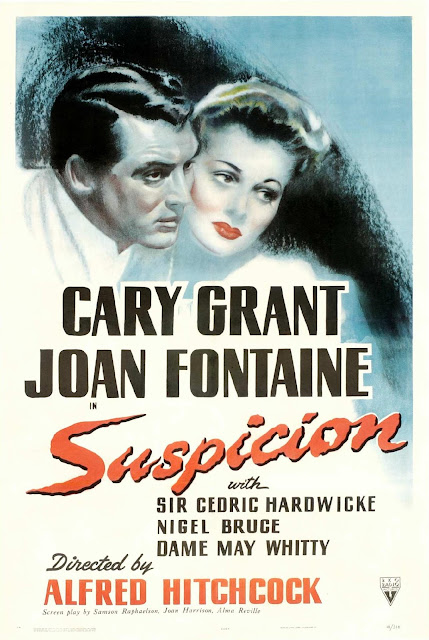Director: Alfred Hitchcock
Cary Grant, Joan Fontaine, Cedric Hardwicke, Nigel Bruce, Dame May Whitty, Isabel Jeans, Heather Angel, Auriol Lee, Reginald Sheffield, Leo G. Carroll.
Cary Grant (Johnnie Aysgarth) was 37 when this was released and perhaps at the pinnacle of his sexual charm (but not at the pinnacle of his career by a long shot); and Joan Fontaine (Lina Aysgarth--not "Linda," as the video jacket mistakenly has it), 24, was fresh from her very fine performance in Rebecca (1940) alongside Laurence Olivier, also directed by Alfred Hitchcock, for which he garnered his only Best Picture Oscar. I don't think this film is nearly as good. It is saved from being something close to annoying at times only by the star power of the leads and a fine supporting cast, especially Nigel Bruce (best known perhaps as Dr. Watson in a number of Sherlock Holmes films) as Cary Grant's friend "Beaky." The problem with the film lies partly with the casting of Cary Grant, although not in his performance as such. He was seen as such a valuable property by the studio that the proper ending of the film was considered inappropriate and so it was changed. Along the way we see a lot of mixed foreshadowing so it is impossible to tell whether his character is that of a loving husband who is a bit of a rogue or a cold-blooded murderer who married Lina for her inheritance and intends to kill her. We can see how the latter possibility might not work so well since she was only getting a subsistence allowance from the will of her father who disapproved of the marriage. And there are all those dark scowls that Grant manufactures, somewhat awkwardly I must say, to keep us in doubt. What is apparent is that Hitchcock had one ending in mind and then had to change it and wasn't able to redo some of the earlier scenes that worked better with the old ending. At any rate, Joan Fontaine is very good, lovely, graceful and focused. With this performance she went one up on her older sister Olivia de Havilland by winning the Best Actress Oscar. And it is a bit of a spicy treat to see Cary Grant as something of a heavy, at least part of the time. For most of us, who have seen him in many films, his character has always been sterling. I must also note that some of the production seems a bit unnatural. Grant wears his suit and tie all buttoned up even when visiting Fontaine in their bedroom (carrying the infamous glass of milk, which I understand was backlighted with a bulb inside the glass to make it almost glow). Fontaine's Lina appears mousey and bookish at the beginning (it is suggested that she was in danger of being an old maid!) but later develops a more sophisticated style. And I don't think Hitchcock or Grant really gave her enough cause for the sort of fear she experienced. The final scene with its quick about-face was not entirely convincing or conclusive either. Contemporary audiences might wince at the plodding direction by Hitchcock. They might even wonder why he decided to make a movie from such a familiar and lightly plotted tale not far removed psychologically from a romance novel. But Hitchcock always erred on the side of giving the mass audience what he thought they wanted. What they wanted here was Cary Grant and Joan Fontaine together romantically with some mystery and doubt along the way.











































No comments:
Post a Comment